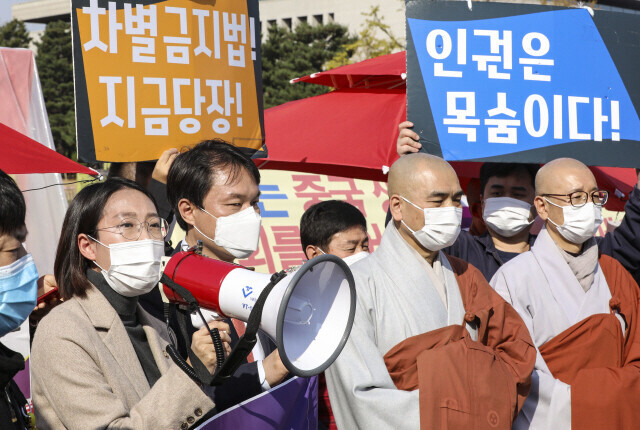hankyoreh
Links to other country sites 다른 나라 사이트 링크
Anti-discrimination legislation would have kept forcibly discharged transgender soldier alive

If South Korea had enacted anti-discrimination legislation, would the late staff sergeant Byun Hee-soo — who was found dead in her home Wednesday at the age of 23 — have been able to remain in the military and continue driving tanks after her gender confirmation surgery?
The likelihood appears high, as such legislation would bar and require corrective action in cases of discriminatory treatment in employment, education and the use of administrative services based on gender, disabilities, ethnicity, religion, sexual orientation and sexual identity in the absence of other “reasonable grounds.”
News of Byun’s recent death by suicide after being forcibly discharged from the South Korean Army because of her gender confirmation surgery has prompted renewed calls for the enactment of an anti-discrimination law.
The Justice Party created a mourning space Thursday in Byun’s memory in front of National Assembly member Jang Hye-young’s office.
“We hope all 300 members of the National Assembly keenly sense their responsibility for Staff Sgt. Byun’s death,” the party said.
In a Facebook post the same day, Democratic Party lawmaker Kwon In-sook wrote, “I am so sorry. I feel guilty over the lack of progress with our equal rights and anti-discrimination legislation.”
The National Assembly has been treading water for over a decade with its discussions toward anti-discrimination legislation. An anti-discrimination bill proposed by the Justice Party in June 2020 remains bogged down in the Legislation and Judiciary Committee without undergoing a single examination.
Another equal rights and anti-discrimination bill currently being prepared by Democratic Party lawmaker Lee Sang-min has likewise failed to gain traction. In a telephone interview Thursday with the Hankyoreh, Lee said, “Even within the [Democratic] party, there are a lot of people who want to dodge LGBTQ issues, and they’re not welcoming about the enactment of anti-discrimination legislation.”
“I’m going to need to muster all the strength I have,” he said.
In the past, Lee has repeatedly put off plans to propose related legislation, explaining that he first planned to work toward winning as much support as possible from South Korea’s Protestant community. Based on the hard lesson learned from anti-discrimination bills failing multiple times in the past due to Protestant objections, he aimed to undertake persuasive efforts, even if that means the process would take more time.
Lee even proposed a compromise that would involve including provisions granting exceptions — stipulating that religious acts based on the essential doctrine of a particular faith would not be viewed as discrimination.
Yet, the Protestant community’s attitude remained unchanged. Meanwhile, the Buddhist community, which has been dealing with acts of anti-Buddhist vandalism by Protestants, has called for enactment of the legislation as originally drafted by the National Human Rights Commission of Korea (NHRCK), decrying the granting of exceptions as “pandering to the Protestants.”
Some politicians are stressing the need to revise strategy and tackle the issue head-on in the wake of Byun’s tragic death.
“The Protestant community remains unchanged in its attitude, and the Buddhist community, which initially agreed with the anti-discrimination legislation, is now objecting to the granting of exceptions,” Lee Sang-min said.
“I plan to remove the exceptions and fine-tune the law’s provisions a bit more before presenting it after the by-elections in April,” he added.
Over 20 Democratic Party and Open Democratic Party lawmakers have added their names as co-sponsors of Lee’s bill. Lee had initially sought to draw over 100 co-sponsors in order to “ride over” Protestant objections — but most lawmakers have long since shied away, concerned about how their actions would come across to large churches in their constituencies.
Indeed, Lee has declined to share a list of the lawmakers who have currently agreed to co-sponsor the bill, due to fears that they could be targeted for attacks by Protestants.
By Lee Ji-hye, staff reporter
Please direct comments or questions to [english@hani.co.kr]

Editorial・opinion
![[Column] Park Geun-hye déjà vu in Yoon Suk-yeol [Column] Park Geun-hye déjà vu in Yoon Suk-yeol](https://flexible.img.hani.co.kr/flexible/normal/500/300/imgdb/original/2024/0424/651713945113788.jpg) [Column] Park Geun-hye déjà vu in Yoon Suk-yeol
[Column] Park Geun-hye déjà vu in Yoon Suk-yeol![[Editorial] New weight of N. Korea’s nuclear threats makes dialogue all the more urgent [Editorial] New weight of N. Korea’s nuclear threats makes dialogue all the more urgent](https://flexible.img.hani.co.kr/flexible/normal/500/300/imgdb/original/2024/0424/7317139454662664.jpg) [Editorial] New weight of N. Korea’s nuclear threats makes dialogue all the more urgent
[Editorial] New weight of N. Korea’s nuclear threats makes dialogue all the more urgent- [Guest essay] The real reason Korea’s new right wants to dub Rhee a founding father
- [Column] ‘Choson’: Is it time we start referring to N. Korea in its own terms?
- [Editorial] Japan’s rewriting of history with Korea has gone too far
- [Column] The president’s questionable capacity for dialogue
- [Column] Are chaebol firms just pizza pies for families to divvy up as they please?
- [Column] Has Korea, too, crossed the Rubicon on China?
- [Correspondent’s column] In Japan’s alliance with US, echoes of its past alliances with UK
- [Editorial] Does Yoon think the Korean public is wrong?
Most viewed articles
- 1‘We must say no’: Seoul defense chief on Korean, USFK involvement in hypothetical Taiwan crisis
- 2Will NewJeans end up collateral damage in internal feud at K-pop juggernaut Hybe?
- 3[Column] Park Geun-hye déjà vu in Yoon Suk-yeol
- 4Why Korea shouldn’t welcome Japan’s newly beefed up defense cooperation with US
- 5Thursday to mark start of resignations by senior doctors amid standoff with government
- 6N. Korean hackers breached 10 defense contractors in South for months, police say
- 7[Guest essay] The real reason Korea’s new right wants to dub Rhee a founding father
- 8[Column] ‘Choson’: Is it time we start referring to N. Korea in its own terms?
- 9Kim Jong-un expressed ‘satisfaction’ with nuclear counterstrike drill directed at South
- 10[Editorial] New weight of N. Korea’s nuclear threats makes dialogue all the more urgent